情态动词[下学期]
图片预览
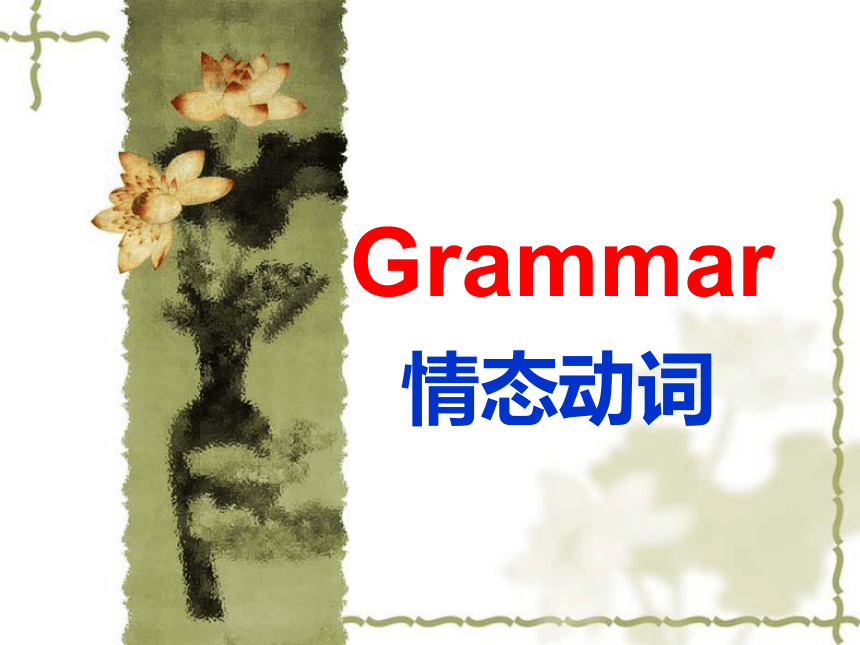
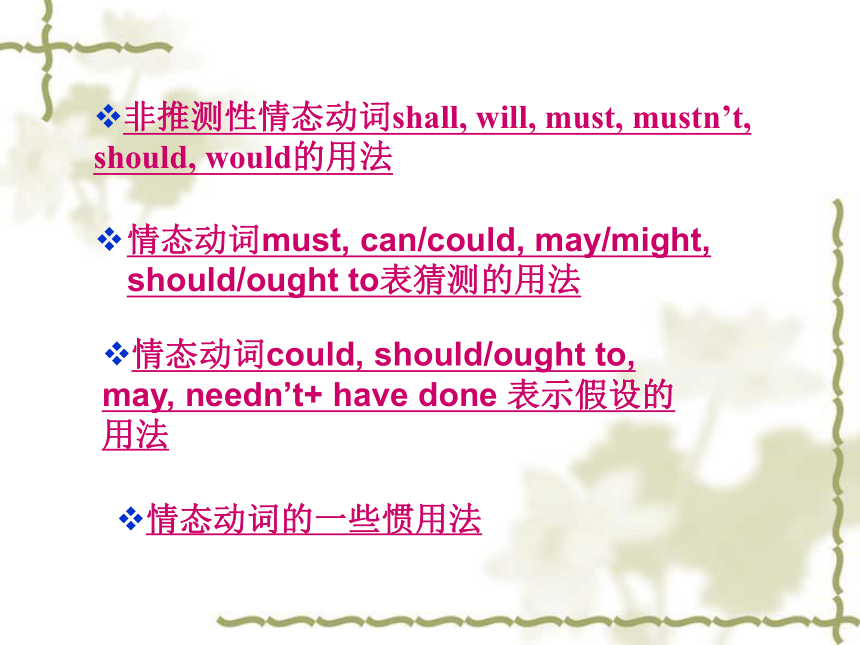
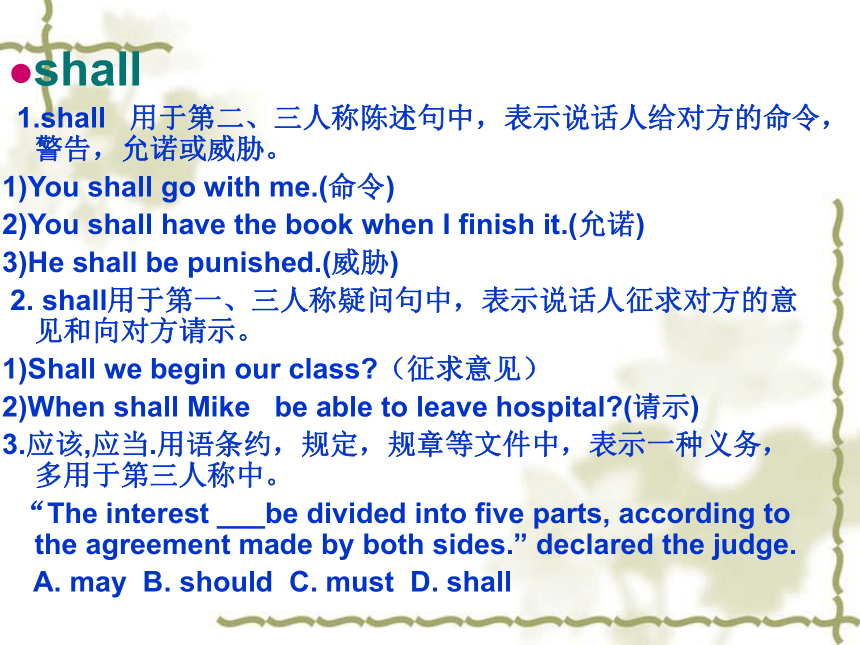
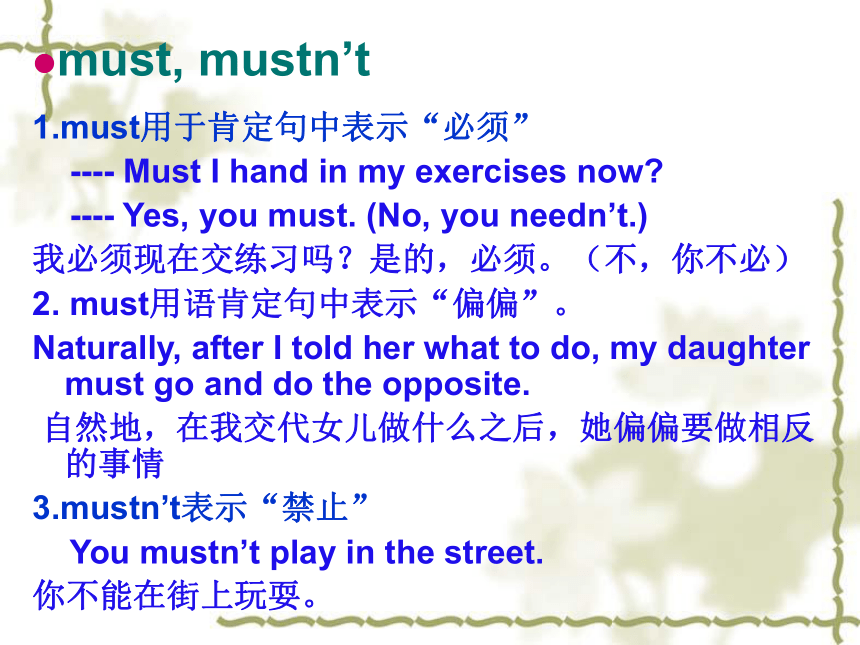
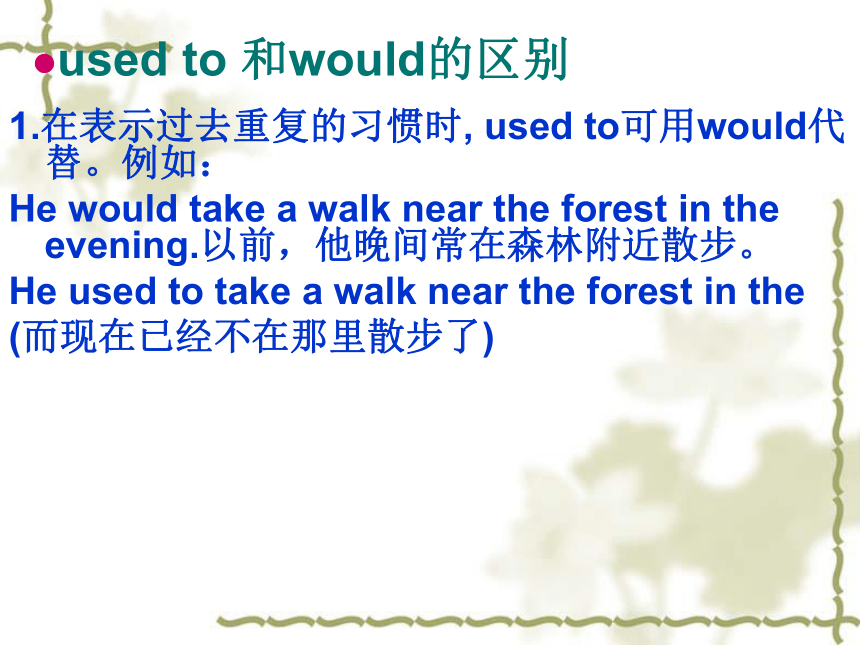
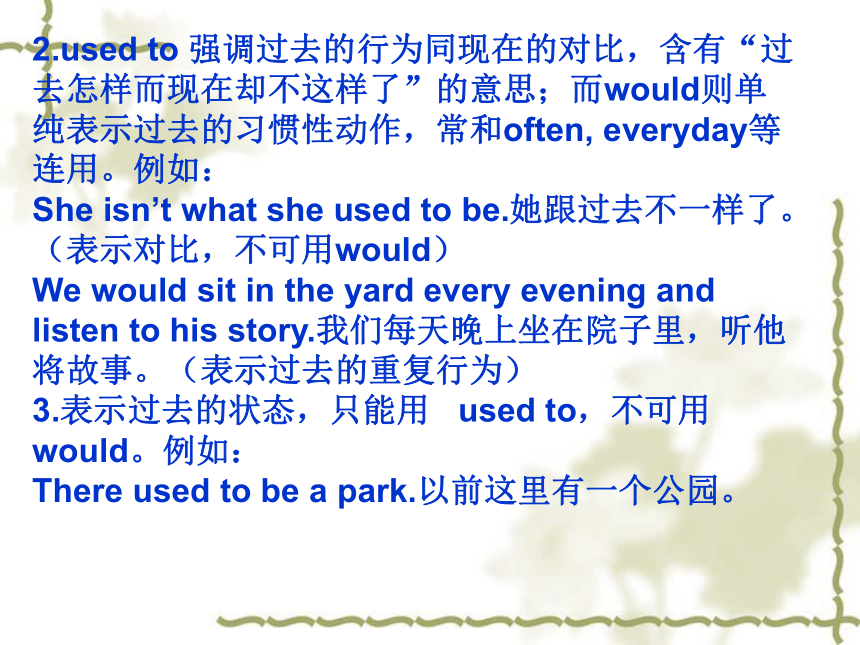
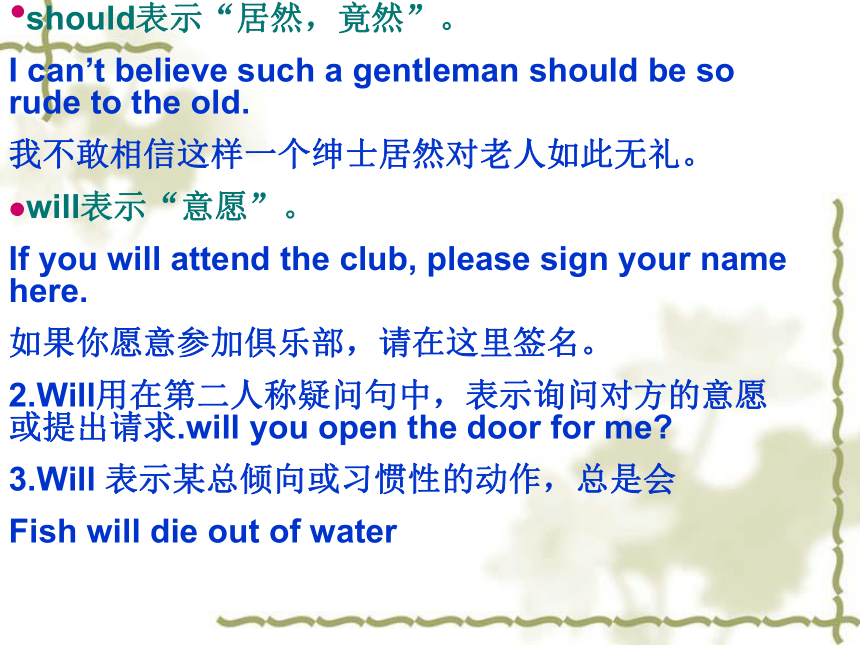
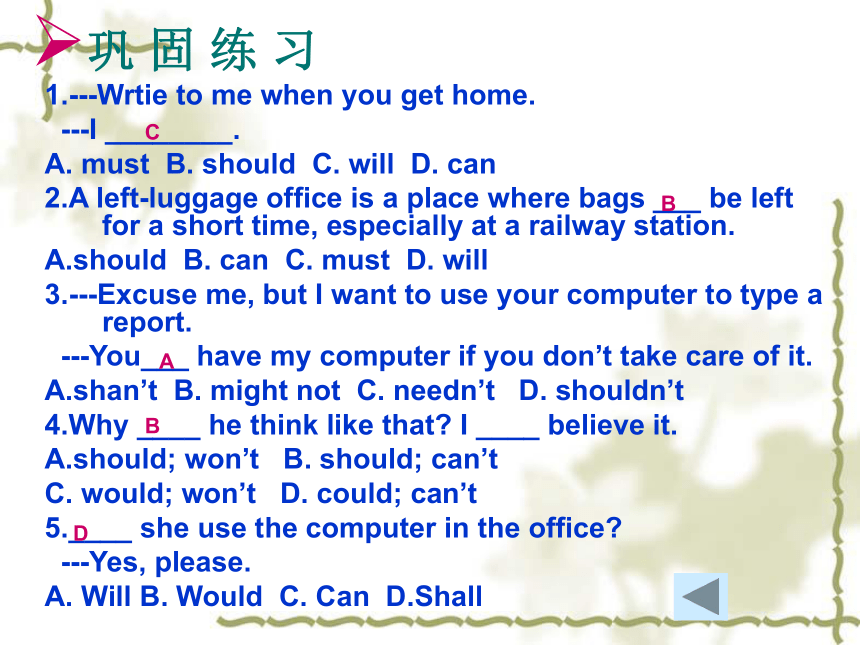
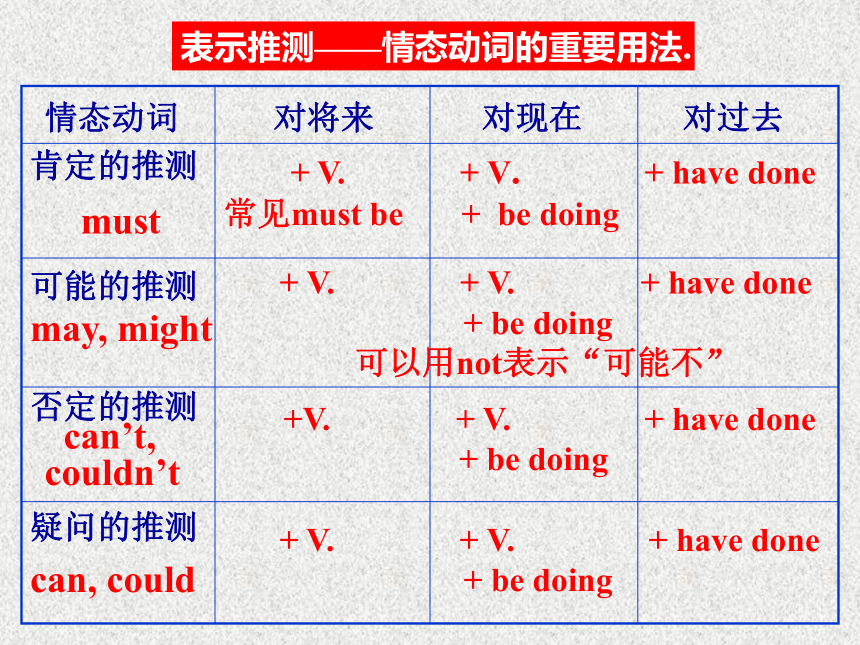
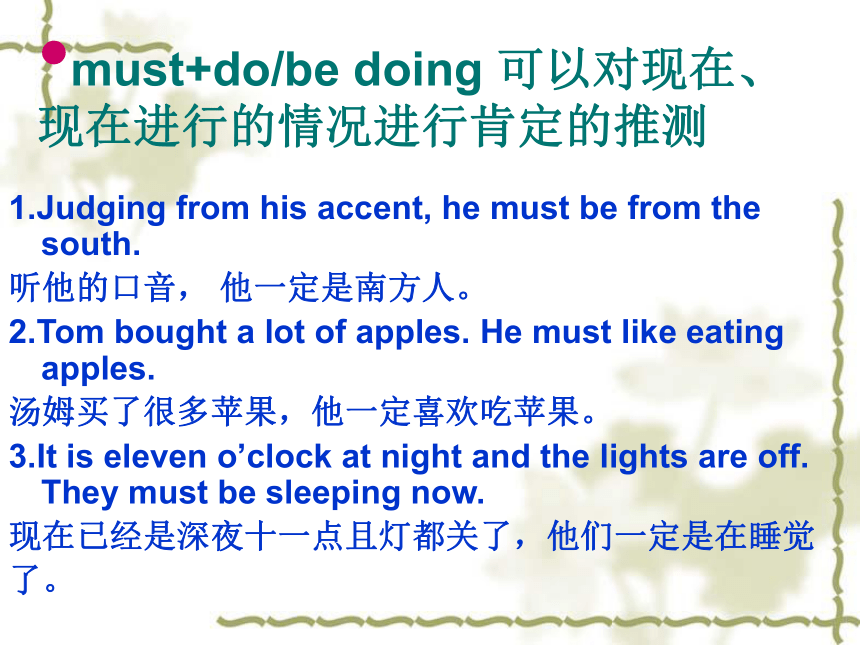

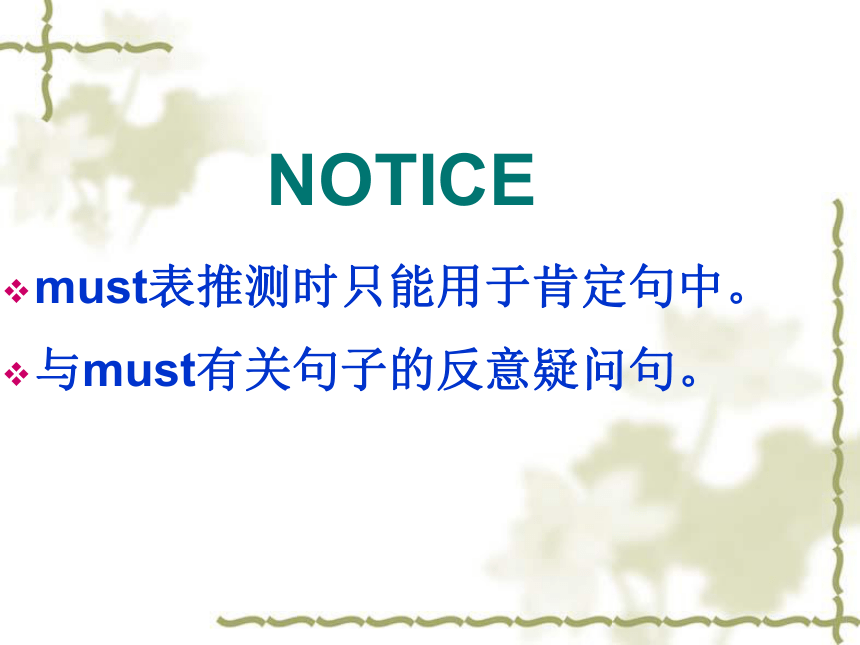
文档简介
课件41张PPT。Grammar情态动词非推测性情态动词shall, will, must, mustn’t, should, would的用法情态动词could, should/ought to, may, needn’t+ have done 表示假设的用法情态动词must, can/could, may/might, should/ought to表猜测的用法情态动词的一些惯用法shall 1.shall 用于第二、三人称陈述句中,表示说话人给对方的命令,警告,允诺或威胁。
1)You shall go with me.(命令)
2)You shall have the book when I finish it.(允诺)
3)He shall be punished.(威胁)
2. shall用于第一、三人称疑问句中,表示说话人征求对方的意见和向对方请示。
1)Shall we begin our class?(征求意见)
2)When shall Mike be able to leave hospital?(请示)
3.应该,应当.用语条约,规定,规章等文件中,表示一种义务,多用于第三人称中。
“The interest ___be divided into five parts, according to the agreement made by both sides.” declared the judge.
A. may B. should C. must D. shallmust, mustn’t1.must用于肯定句中表示“必须”
---- Must I hand in my exercises now?
---- Yes, you must. (No, you needn’t.)
我必须现在交练习吗?是的,必须。(不,你不必)
2. must用语肯定句中表示“偏偏”。
Naturally, after I told her what to do, my daughter must go and do the opposite.
自然地,在我交代女儿做什么之后,她偏偏要做相反的事情
3.mustn’t表示“禁止”
You mustn’t play in the street.
你不能在街上玩耍。
used to 和would的区别1.在表示过去重复的习惯时, used to可用would代替。例如:
He would take a walk near the forest in the evening.以前,他晚间常在森林附近散步。
He used to take a walk near the forest in the
(而现在已经不在那里散步了)2.used to 强调过去的行为同现在的对比,含有“过去怎样而现在却不这样了”的意思;而would则单纯表示过去的习惯性动作,常和often, everyday等连用。例如:
She isn’t what she used to be.她跟过去不一样了。(表示对比,不可用would)
We would sit in the yard every evening and listen to his story.我们每天晚上坐在院子里,听他将故事。(表示过去的重复行为)
3.表示过去的状态,只能用 used to,不可用would。例如:
There used to be a park.以前这里有一个公园。should表示“居然,竟然”。
I can’t believe such a gentleman should be so rude to the old.
我不敢相信这样一个绅士居然对老人如此无礼。
will表示“意愿”。
If you will attend the club, please sign your name here.
如果你愿意参加俱乐部,请在这里签名。
2.Will用在第二人称疑问句中,表示询问对方的意愿或提出请求.will you open the door for me?
3.Will 表示某总倾向或习惯性的动作,总是会
Fish will die out of water 巩 固 练 习1.---Wrtie to me when you get home.
---I ________.
A. must B. should C. will D. can
2.A left-luggage office is a place where bags ___ be left for a short time, especially at a railway station.
A.should B. can C. must D. will
3.---Excuse me, but I want to use your computer to type a report.
---You___ have my computer if you don’t take care of it.
A.shan’t B. might not C. needn’t D. shouldn’t
4.Why ____ he think like that? I ____ believe it.
A.should; won’t B. should; can’t
C. would; won’t D. could; can’t
5.____ she use the computer in the office?
---Yes, please.
A. Will B. Would C. Can D.ShallCBABD表示推测——情态动词的重要用法.肯定的推测
可能的推测
否定的推测
疑问的推测must 对将来 对现在 对过去情态动词may, might can’t,
couldn’tcan, could + V. + V. + have done
常见must be + be doing + V. + V. + have done
+ be doing
可以用not表示“可能不”
+V. + V. + have done
+ be doing+ V. + V. + have done
+ be doingmust+do/be doing 可以对现在、现在进行的情况进行肯定的推测1.Judging from his accent, he must be from the south.
听他的口音, 他一定是南方人。
2.Tom bought a lot of apples. He must like eating apples.
汤姆买了很多苹果,他一定喜欢吃苹果。
3.It is eleven o’clock at night and the lights are off. They must be sleeping now.
现在已经是深夜十一点且灯都关了,他们一定是在睡觉
了。must +have done 表示对过去已经发生的行为进行推测,意为“想必/准是/一定作了某事”。1.It must have rained last night, for the road was very muddy.
昨晚 一定是下雨了, 因为地上很泥泞。
2.We must have learned 2,000 words by the end of last term.
到上学期为止我们一定学了有两千个单词 。
3.He must have gone to Beijing.
他一定已经去北京了。
NOTICEmust表推测时只能用于肯定句中。
与must有关句子的反意疑问句。1.Judging from his accident, he must be from the south,2.Tom bought a lot of apples. He must like eating apples,3.It is eleven o’clock at night and the lights are off. They must be sleeping now,isn’t, he? doesn’t he?aren’t they?因must后是实意动词like因must后是系动词 be must后接的是be sleeping,是对正在进行的情况推测1.We must have learned 2,000 words by the end of last term,hadn’t we?3.He must have gone to Beijing,didn’t it?hasn’t he? 若句中含有过去完成时的时间状语,用过去完成 时完成反意疑问句若句中含有过去的时间状语,用一般过去时完成反意疑问句若句中不含任何时间状语, 用现在完成时完成反意疑问句2.It must have rained last night, for the road was very muddy,can 后跟动词原形,表示对现在情况的否定和疑问推测
1. Mr Li has gone to Beijing. The man at the gate can’t be him。
李老师去北京了.门口的那个人不可能是他。
2. The watch is not yours. Who else’s can it be?
这块表不是你的,它可能是谁的呢?
can/could+have done表示对过去的行为的怀疑和不肯定,通常用在否定句和疑问句中。1. Can they have won the basketball match?
他们可能赢了篮球赛吗?
2. It couldn’t have been Mr. Green. He has gone to
New York.
那不可能是格林先生的,他已经去北京了。may/might后跟动词原形,表示对现在情况的推测。may/might+have done表示对过去已发生行为的推测,意为“也许/或许/已经…”。一般只用语肯定句和否定句中,不用与疑问句。might比may更委婉、含蓄和不肯定。
1. He may/might be English.
他可能是英国人。
2. It’s too late. I think he may have gone to bed.
太晚了,我想他可能已经睡觉了。
3. He may/might not have finished the work.
他可能没有完成工作。should/ought to表示推测,意为“理应,应该”。They left yesterday. They should be home by now.
他们昨天就离开了,现在理应到家了。巩 固 练 习 1.---What ____ it be?
---It ____ be a mail box, for it is moving. It ___ be a car.
A. can; can’t; must B. can; can; must
C. can; mustn’t; must D. must; mustn’t can
2. ---Isn’t that Ann’s husband over there?
---No. it ____ be him---I’m sure he doesn’t wear glasses.
A.can’t B. must not C. won’t D, may not
3.---When can I come for the photos? I need them tomorrow afternoon.
---They ____ be ready by 12:00.
A. can B. should C. might D. need
4.---are you coming to Jeff’s party?
---I’m not sure. I ___ go to the concert instead.
A. must B. would C. should D. might
AABD5.---You may laugh, but I’ve been thinking of becoming a vegetarian.
---Oh, you ____ be out of your mind. You will be hungry all the time.
A. will B. may C. must D. should
6.---I wonder why they are late?
---They _____ the train.
can’t have missed B. could miss
C. must have missed D. might miss
7.---Show me your permit, please!
---Oh, it’s not in my pocket. It ______.
A. might fall out B. could fall out
C. should have fallen out D. must have fallen out
CCD7. ---Has Mike started? He said he would join in the party.
---He ____. He is a man of keeping his word.
A. could have left B. must have left
C. can’t come D. won’t be coming
8.Everything has two sides. Beautiful songs, sometimes, ___ be just noise to others.
must B. may C. should D. could
9. ---There were already five people in the car, but they managed to take me as well.
---It ___ a comfortable journey.
A.can’t be B. mustn’t have been
C. should be D. couldn’t have been
10.Chinese must have the largest number of speakers, ____.
A.mustn’t they B. haven’t they C. doesn’t it D. didn’t they
BBDCcould(不用can)+have done,在肯定句中表示“本来能够…而没能…”,具有婉转的批评和责备之意。1. I could have passed my exam easily, but I made too many stupid mistakes.
我本来能够轻易通过考试,但我犯了太多不该 犯的错误。
2.You could have reported to me earlier.
你本该早点告诉我的。should/ought to+have done用于肯定句时,表示“本该做某事而实际上没做”,用于否定句时,则表示“不该做的事反而做了”。
1.You should have told him a week ago.
你本来应该在一周前告诉他的。
2.You ought not to have taken the magazine out of the reading room.
他不该、把杂志带出阅览室的。might+have done表示“本来可能…”,但实际上没有发生的事。另外,还可表示“本来应该或可以做某事”之意,含有轻微的责备语气。1.You might not have told her.
你本可以不告诉他的。(事实上你告诉他了)
2. You might have come earlier.
你本可以早点来的。(但没有这样)
3.He may have learnt this news注意对need问句的回答:
--Need I finish the work today?
--Yes, ________________.
No, ________________.
No, ________________.you mustyou needn’tyou don’t have toneedn’t 对其它情态动词的回答:
--Shall I tell John about it?
--No, you __________.
--Must we do it now?
--No, you __________.
needn’t
(don’t have to) needn’t
(don’t have to)needn’t +have done表示做了本来不必去做的事。1.She needn’t have gone to the station yesterday.
昨天她本不必到火车站去的.(昨天她去了)
2.You needn’t have bought it.
你本可不必买它的。 (你买了)
巩 固 练 习 1.Oh, I’m not feeling well in the stomach. I ____ so much fried chicken just now.
A. shouldn’t eat B. shouldn’t have eaten
C. mustn’t eat D. mustn’t have eaten
2.---Why hasn’t Jane arrived yet?
---She ____ again in the morning.
A. shouldn’t have overslept
B. may have turned off the alarm clock
C. must have no one to call her
D. should have someone to wake her up
3.---Did you go to the movie the day before yesterday?
----No. We ___, but we decided not to.
A.should have gone B. could go
C. should go D. could have gone
BBA4.As it turned out to be a small house party, we ____ so formally.
needn’t dress
B. didn’t have to dress up
C. Might not have dressed up
D. needn’t have dressed up
5.I’m rather surprised you haven’t reported him to your teacher. In my opinion, you ___ this as soon as you found out he was cheating.
must have done B. might have done
C. should have done D. could have done
DC可兼做行为动词的情态动词:need 、 dare 情态动词 (+动词原形)行为动词 .needdare 1.无人称和数的变化; 2.尤其用于:*否定句及疑问句中;*在if/whether之后;*或与hardly, never,
no one, nobody连用; 3.常以needn’t 和daren’t
的形式出现;4.dare有其过去时dared. 多用于肯定句;
(sb.) need to do
dare to do
(sth.) need to be
done
(sth.) need doing
判断正误:
He daren’t to speak English before such a crowd, did he?He daren’t speak English before such a crowd, dare he?Nobody need to be afraid of catching the disease.
Nobody need be afraid of catching the disease.These dishes need be cleaned carefully.
These dishes need to be cleaned carefully.
These dishes need cleaning carefully.不同的“肯定”程度可按下列层次排列:
He is at home. (事实)
He must be at home.(非常肯定的推断)
He could be at home.(很可能)
He ought to be at home.(很可能)
He may be at home.(仅仅可能而已)
He might be at home.(或许, 非常不确定)
He might not be at home.(也许不在家)
He may not be at home. (比might可能)
He couldn’t be at home.(很可能不在家)
He can’t be at home.(一定不在家)
He isn't at home.(事实) 1.cannot…too/enough表示“无论怎么…也不(过分)…”,“越…越好”。例如:
You cannot be too careful.你越小心越好 。
You cannot remember enough English words.你记的英语单词越越好 。
2.cannot but+do sth表示“不得不,只好”。
I cannot but admire your bravery.我不得不钦佩你的勇气 。
I could not but choose to go.我只好去 。
3.may well may as well
“may well+do”是一种常用结构 ,意为“(完全)能 ,很可能 ,”相当于be very likely to。例如 :
He may well be proud of his son.他大可为儿子高兴。
Her appearance has changed so much that you may well not recognize her.她的模样变化太大,你很可能人不出她了。
“may as well+do”表示 “最好,满可以,倒不如”,相当于had better或 to have no strong reason not to。例如 :
You may as well stay here over the night.你最好留在 这里过夜。
You may as well do it at once.你最好马上做这件事 。
We may as well stay where we are.我们留在现在的地方倒也不错 。
You may as well tell me the truth.你还是把镇想告诉我的好 。1. 表示能力、许可的情态动词的用法。 表示能力: can, could, be able to
*be able to 能用于各种时态。
can / could 只能表示现在或过去的能力。
*was / were able to : “设法做成某事”
相当于 managed to do sth.
succeeded in doing sth1. A computer ______ think for itself; it must
be told what to do.
A. can’t B. couldn’t
C. may not D. might not2. The fire spread through the hotel very quickly
but everyone ______ get out.
A. had to B. would
C. could D. was able toA D 表示许可: may / might, can / could
* might, could 比较委婉, 一般多用于疑问句.
* can, may 表达的语言比较随便.
* 在以could, might 表示征询对方意见
或表示请求时,回答应相应使用can, may.2. 表示否定的情态动词的用法:
部分情态动词的否定式是情态动词中的考点
之一。
mustn’t 不准, 禁止
needn’t 没必要 ( = don’t have to )
can’t 不能; 不可能
may not 不可以; 可能不
shouldn’t 不应该 ( = ought not to )情态动词:shall, will 的多种意义: shall / will+ 动词原形: * shall 可表示必须、命令、 警告或征询意见. * will 可表示意愿、常出现的动作、在疑问句
中表示请求和建议.* 均可表示将来。 过去时为 should, would.3.Thanks a lot!
1)You shall go with me.(命令)
2)You shall have the book when I finish it.(允诺)
3)He shall be punished.(威胁)
2. shall用于第一、三人称疑问句中,表示说话人征求对方的意见和向对方请示。
1)Shall we begin our class?(征求意见)
2)When shall Mike be able to leave hospital?(请示)
3.应该,应当.用语条约,规定,规章等文件中,表示一种义务,多用于第三人称中。
“The interest ___be divided into five parts, according to the agreement made by both sides.” declared the judge.
A. may B. should C. must D. shallmust, mustn’t1.must用于肯定句中表示“必须”
---- Must I hand in my exercises now?
---- Yes, you must. (No, you needn’t.)
我必须现在交练习吗?是的,必须。(不,你不必)
2. must用语肯定句中表示“偏偏”。
Naturally, after I told her what to do, my daughter must go and do the opposite.
自然地,在我交代女儿做什么之后,她偏偏要做相反的事情
3.mustn’t表示“禁止”
You mustn’t play in the street.
你不能在街上玩耍。
used to 和would的区别1.在表示过去重复的习惯时, used to可用would代替。例如:
He would take a walk near the forest in the evening.以前,他晚间常在森林附近散步。
He used to take a walk near the forest in the
(而现在已经不在那里散步了)2.used to 强调过去的行为同现在的对比,含有“过去怎样而现在却不这样了”的意思;而would则单纯表示过去的习惯性动作,常和often, everyday等连用。例如:
She isn’t what she used to be.她跟过去不一样了。(表示对比,不可用would)
We would sit in the yard every evening and listen to his story.我们每天晚上坐在院子里,听他将故事。(表示过去的重复行为)
3.表示过去的状态,只能用 used to,不可用would。例如:
There used to be a park.以前这里有一个公园。should表示“居然,竟然”。
I can’t believe such a gentleman should be so rude to the old.
我不敢相信这样一个绅士居然对老人如此无礼。
will表示“意愿”。
If you will attend the club, please sign your name here.
如果你愿意参加俱乐部,请在这里签名。
2.Will用在第二人称疑问句中,表示询问对方的意愿或提出请求.will you open the door for me?
3.Will 表示某总倾向或习惯性的动作,总是会
Fish will die out of water 巩 固 练 习1.---Wrtie to me when you get home.
---I ________.
A. must B. should C. will D. can
2.A left-luggage office is a place where bags ___ be left for a short time, especially at a railway station.
A.should B. can C. must D. will
3.---Excuse me, but I want to use your computer to type a report.
---You___ have my computer if you don’t take care of it.
A.shan’t B. might not C. needn’t D. shouldn’t
4.Why ____ he think like that? I ____ believe it.
A.should; won’t B. should; can’t
C. would; won’t D. could; can’t
5.____ she use the computer in the office?
---Yes, please.
A. Will B. Would C. Can D.ShallCBABD表示推测——情态动词的重要用法.肯定的推测
可能的推测
否定的推测
疑问的推测must 对将来 对现在 对过去情态动词may, might can’t,
couldn’tcan, could + V. + V. + have done
常见must be + be doing + V. + V. + have done
+ be doing
可以用not表示“可能不”
+V. + V. + have done
+ be doing+ V. + V. + have done
+ be doingmust+do/be doing 可以对现在、现在进行的情况进行肯定的推测1.Judging from his accent, he must be from the south.
听他的口音, 他一定是南方人。
2.Tom bought a lot of apples. He must like eating apples.
汤姆买了很多苹果,他一定喜欢吃苹果。
3.It is eleven o’clock at night and the lights are off. They must be sleeping now.
现在已经是深夜十一点且灯都关了,他们一定是在睡觉
了。must +have done 表示对过去已经发生的行为进行推测,意为“想必/准是/一定作了某事”。1.It must have rained last night, for the road was very muddy.
昨晚 一定是下雨了, 因为地上很泥泞。
2.We must have learned 2,000 words by the end of last term.
到上学期为止我们一定学了有两千个单词 。
3.He must have gone to Beijing.
他一定已经去北京了。
NOTICEmust表推测时只能用于肯定句中。
与must有关句子的反意疑问句。1.Judging from his accident, he must be from the south,2.Tom bought a lot of apples. He must like eating apples,3.It is eleven o’clock at night and the lights are off. They must be sleeping now,isn’t, he? doesn’t he?aren’t they?因must后是实意动词like因must后是系动词 be must后接的是be sleeping,是对正在进行的情况推测1.We must have learned 2,000 words by the end of last term,hadn’t we?3.He must have gone to Beijing,didn’t it?hasn’t he? 若句中含有过去完成时的时间状语,用过去完成 时完成反意疑问句若句中含有过去的时间状语,用一般过去时完成反意疑问句若句中不含任何时间状语, 用现在完成时完成反意疑问句2.It must have rained last night, for the road was very muddy,can 后跟动词原形,表示对现在情况的否定和疑问推测
1. Mr Li has gone to Beijing. The man at the gate can’t be him。
李老师去北京了.门口的那个人不可能是他。
2. The watch is not yours. Who else’s can it be?
这块表不是你的,它可能是谁的呢?
can/could+have done表示对过去的行为的怀疑和不肯定,通常用在否定句和疑问句中。1. Can they have won the basketball match?
他们可能赢了篮球赛吗?
2. It couldn’t have been Mr. Green. He has gone to
New York.
那不可能是格林先生的,他已经去北京了。may/might后跟动词原形,表示对现在情况的推测。may/might+have done表示对过去已发生行为的推测,意为“也许/或许/已经…”。一般只用语肯定句和否定句中,不用与疑问句。might比may更委婉、含蓄和不肯定。
1. He may/might be English.
他可能是英国人。
2. It’s too late. I think he may have gone to bed.
太晚了,我想他可能已经睡觉了。
3. He may/might not have finished the work.
他可能没有完成工作。should/ought to表示推测,意为“理应,应该”。They left yesterday. They should be home by now.
他们昨天就离开了,现在理应到家了。巩 固 练 习 1.---What ____ it be?
---It ____ be a mail box, for it is moving. It ___ be a car.
A. can; can’t; must B. can; can; must
C. can; mustn’t; must D. must; mustn’t can
2. ---Isn’t that Ann’s husband over there?
---No. it ____ be him---I’m sure he doesn’t wear glasses.
A.can’t B. must not C. won’t D, may not
3.---When can I come for the photos? I need them tomorrow afternoon.
---They ____ be ready by 12:00.
A. can B. should C. might D. need
4.---are you coming to Jeff’s party?
---I’m not sure. I ___ go to the concert instead.
A. must B. would C. should D. might
AABD5.---You may laugh, but I’ve been thinking of becoming a vegetarian.
---Oh, you ____ be out of your mind. You will be hungry all the time.
A. will B. may C. must D. should
6.---I wonder why they are late?
---They _____ the train.
can’t have missed B. could miss
C. must have missed D. might miss
7.---Show me your permit, please!
---Oh, it’s not in my pocket. It ______.
A. might fall out B. could fall out
C. should have fallen out D. must have fallen out
CCD7. ---Has Mike started? He said he would join in the party.
---He ____. He is a man of keeping his word.
A. could have left B. must have left
C. can’t come D. won’t be coming
8.Everything has two sides. Beautiful songs, sometimes, ___ be just noise to others.
must B. may C. should D. could
9. ---There were already five people in the car, but they managed to take me as well.
---It ___ a comfortable journey.
A.can’t be B. mustn’t have been
C. should be D. couldn’t have been
10.Chinese must have the largest number of speakers, ____.
A.mustn’t they B. haven’t they C. doesn’t it D. didn’t they
BBDCcould(不用can)+have done,在肯定句中表示“本来能够…而没能…”,具有婉转的批评和责备之意。1. I could have passed my exam easily, but I made too many stupid mistakes.
我本来能够轻易通过考试,但我犯了太多不该 犯的错误。
2.You could have reported to me earlier.
你本该早点告诉我的。should/ought to+have done用于肯定句时,表示“本该做某事而实际上没做”,用于否定句时,则表示“不该做的事反而做了”。
1.You should have told him a week ago.
你本来应该在一周前告诉他的。
2.You ought not to have taken the magazine out of the reading room.
他不该、把杂志带出阅览室的。might+have done表示“本来可能…”,但实际上没有发生的事。另外,还可表示“本来应该或可以做某事”之意,含有轻微的责备语气。1.You might not have told her.
你本可以不告诉他的。(事实上你告诉他了)
2. You might have come earlier.
你本可以早点来的。(但没有这样)
3.He may have learnt this news注意对need问句的回答:
--Need I finish the work today?
--Yes, ________________.
No, ________________.
No, ________________.you mustyou needn’tyou don’t have toneedn’t 对其它情态动词的回答:
--Shall I tell John about it?
--No, you __________.
--Must we do it now?
--No, you __________.
needn’t
(don’t have to) needn’t
(don’t have to)needn’t +have done表示做了本来不必去做的事。1.She needn’t have gone to the station yesterday.
昨天她本不必到火车站去的.(昨天她去了)
2.You needn’t have bought it.
你本可不必买它的。 (你买了)
巩 固 练 习 1.Oh, I’m not feeling well in the stomach. I ____ so much fried chicken just now.
A. shouldn’t eat B. shouldn’t have eaten
C. mustn’t eat D. mustn’t have eaten
2.---Why hasn’t Jane arrived yet?
---She ____ again in the morning.
A. shouldn’t have overslept
B. may have turned off the alarm clock
C. must have no one to call her
D. should have someone to wake her up
3.---Did you go to the movie the day before yesterday?
----No. We ___, but we decided not to.
A.should have gone B. could go
C. should go D. could have gone
BBA4.As it turned out to be a small house party, we ____ so formally.
needn’t dress
B. didn’t have to dress up
C. Might not have dressed up
D. needn’t have dressed up
5.I’m rather surprised you haven’t reported him to your teacher. In my opinion, you ___ this as soon as you found out he was cheating.
must have done B. might have done
C. should have done D. could have done
DC可兼做行为动词的情态动词:need 、 dare 情态动词 (+动词原形)行为动词 .needdare 1.无人称和数的变化; 2.尤其用于:*否定句及疑问句中;*在if/whether之后;*或与hardly, never,
no one, nobody连用; 3.常以needn’t 和daren’t
的形式出现;4.dare有其过去时dared. 多用于肯定句;
(sb.) need to do
dare to do
(sth.) need to be
done
(sth.) need doing
判断正误:
He daren’t to speak English before such a crowd, did he?He daren’t speak English before such a crowd, dare he?Nobody need to be afraid of catching the disease.
Nobody need be afraid of catching the disease.These dishes need be cleaned carefully.
These dishes need to be cleaned carefully.
These dishes need cleaning carefully.不同的“肯定”程度可按下列层次排列:
He is at home. (事实)
He must be at home.(非常肯定的推断)
He could be at home.(很可能)
He ought to be at home.(很可能)
He may be at home.(仅仅可能而已)
He might be at home.(或许, 非常不确定)
He might not be at home.(也许不在家)
He may not be at home. (比might可能)
He couldn’t be at home.(很可能不在家)
He can’t be at home.(一定不在家)
He isn't at home.(事实) 1.cannot…too/enough表示“无论怎么…也不(过分)…”,“越…越好”。例如:
You cannot be too careful.你越小心越好 。
You cannot remember enough English words.你记的英语单词越越好 。
2.cannot but+do sth表示“不得不,只好”。
I cannot but admire your bravery.我不得不钦佩你的勇气 。
I could not but choose to go.我只好去 。
3.may well may as well
“may well+do”是一种常用结构 ,意为“(完全)能 ,很可能 ,”相当于be very likely to。例如 :
He may well be proud of his son.他大可为儿子高兴。
Her appearance has changed so much that you may well not recognize her.她的模样变化太大,你很可能人不出她了。
“may as well+do”表示 “最好,满可以,倒不如”,相当于had better或 to have no strong reason not to。例如 :
You may as well stay here over the night.你最好留在 这里过夜。
You may as well do it at once.你最好马上做这件事 。
We may as well stay where we are.我们留在现在的地方倒也不错 。
You may as well tell me the truth.你还是把镇想告诉我的好 。1. 表示能力、许可的情态动词的用法。 表示能力: can, could, be able to
*be able to 能用于各种时态。
can / could 只能表示现在或过去的能力。
*was / were able to : “设法做成某事”
相当于 managed to do sth.
succeeded in doing sth1. A computer ______ think for itself; it must
be told what to do.
A. can’t B. couldn’t
C. may not D. might not2. The fire spread through the hotel very quickly
but everyone ______ get out.
A. had to B. would
C. could D. was able toA D 表示许可: may / might, can / could
* might, could 比较委婉, 一般多用于疑问句.
* can, may 表达的语言比较随便.
* 在以could, might 表示征询对方意见
或表示请求时,回答应相应使用can, may.2. 表示否定的情态动词的用法:
部分情态动词的否定式是情态动词中的考点
之一。
mustn’t 不准, 禁止
needn’t 没必要 ( = don’t have to )
can’t 不能; 不可能
may not 不可以; 可能不
shouldn’t 不应该 ( = ought not to )情态动词:shall, will 的多种意义: shall / will+ 动词原形: * shall 可表示必须、命令、 警告或征询意见. * will 可表示意愿、常出现的动作、在疑问句
中表示请求和建议.* 均可表示将来。 过去时为 should, would.3.Thanks a lot!
